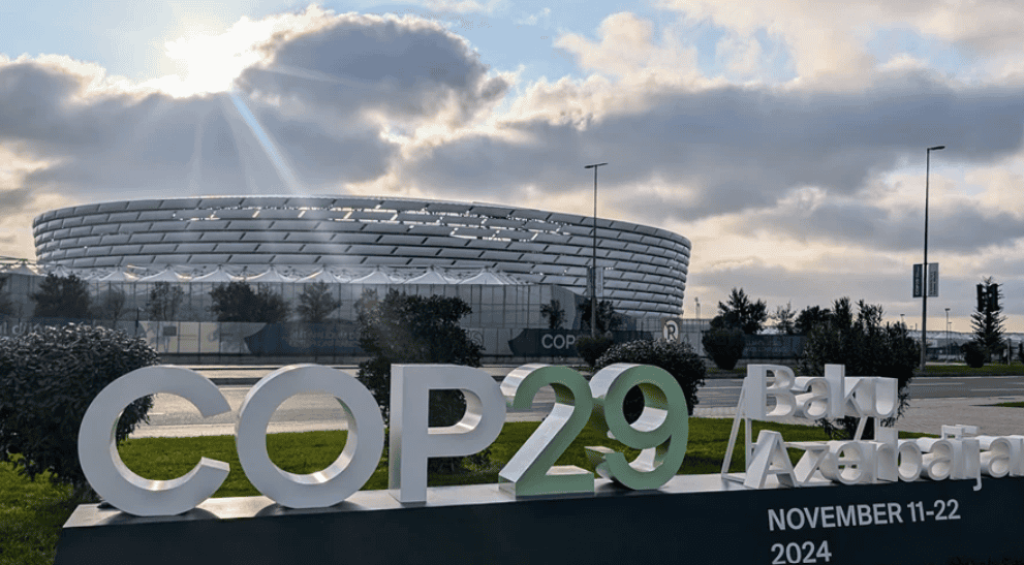Azerbaijan’s capital, Baku hosted the annual global climate Conference of the Parties (COP) from November 11–23 2024. Over 60,000 delegates were registered from nearly 200 countries for COP29. Dubbed a “Climate Finance COP”, the annual Conference of the Parties dedicated to climate change centered on one of the most challenging issues facing countries: how to pay for the global climate transition.
As an observer organization to climate negotiations, the World Bank Group (WBG) is not party to the negotiations themselves – instead our engagement in Baku focused on showcasing important progress made on our climate commitments and key new initiations.
Given the focus on climate finance, the World Bank Group’s announcements at COP demonstrated both strong delivery and ambitious partnership.
Promises into Progress
Given the focus on climate finance, the WBG’s announcements at COP demonstrated both strong delivery and ambitious partnership. This included reaffirming the target that 45% of our total lending will support climate efforts in our current fiscal year (FY25). We have already hit 44% in FY24 with $43 billion delivered. This milestone underscores the WBG’s role as a key financier for countries striving to meet their climate goals. Together, with the MDBs, we also announced a commitment to provide $120 billion annually in climate finance for low- and middle-income countries by 2030, with $42 billion dedicated to adaptation and $65 billion mobilized from the private sector.
We announced new programs targeting additional sectors and countries to reduce methane emissions, advancing one of the most impactful strategies for near-term climate mitigation. We also advanced our carbon markets work with the launch of tools such as a Country Guidance Note, a report on financial and market integrity, and a roadmap for interoperable market infrastructure aimed at supporting countries in building robust and transparent systems.
Another highlight was disseminating about the recently launched “Mission 300”, a partnership with the African Development Bank designed to deliver electricity access to 300 million people in Africa by 2030. This initiative not only addresses energy poverty but also paves the way for sustainable development through renewable energy solutions.
Together, with the MDBs, we also announced a commitment to provide $120 billion annually in climate finance for low- and middle-income countries by 2030, with $42 billion dedicated to adaptation and $65 billion mobilized from the private sector.
Innovating for Resilience and Private Finance
Given the worsening impacts of climate change, the WBG also expanded its Climate Resilient Debt Clauses to now cover natural disasters such as droughts, floods, and pandemics, offering vulnerable countries much-needed financial flexibility during crises. The new People in a Changing Climate: From Vulnerability to Action report highlighted the human dimensions of climate change, emphasizing adaptive strategies to build resilience among the most affected populations.
Along with the Climate Investment Funds and UK Prime Minister Keir Starmer, President Banga launched a bond issuance program to mobilize finance for climate action and sustainable development on the London Stock Exchange. The UK also signaled a strong contribution to the SCALE partnership which aims to provide high-impact concessional finance to support countries to generate and transact high-integrity, socially inclusive carbon credits.
Mixed Progress in the Negotiations and the Road to Belém
While COP29 achieved some important milestones – most notably agreement on the operationalization of Article 6 which represented a breakthrough after nearly a decade of negotiations – other issues proved more challenging.
Discussions on the new climate finance target – the New Collective Quantified Goal (NCQG) on climate finance – revealed significant gaps. The NCQG was set to replace the $100 billion finance target as a key driver of greater climate ambition, both reducing emissions faster and making people safer in the face of increasing climate risk. The new target agreed by COP29 negotiators of $300 billion annually by 2035 fell far short of meeting developing countries’ demands for a more ambitious target of $1.3 trillion per year. Progress was also limited on bringing forward the UAE Consensus reached at COP28 transitioning away from fossil fuels in energy systems in a just, orderly and equitable manner, or addressing findings from the first Global Stocktake, which leaves much critical work for future COPs.
Although the dust has barely settled in Baku, the road to Belém is already taking shape. Key on the journey to COP30 will be all countries’ new revised national climate targets Nationally Determined Contributions (NDCs) 3.0 – an important articulation of countries’ climate ambitions. The journey from Baku to Brazil presents a pivotal opportunity to consolidate gains and drive a sustainable, inclusive, and resilient future.
Progress on promises from COP28:
- Carbon Markets
- Crisis Preparedness and Response Toolkit
- MDB Common Approach to Measuring Climate Results
- Methane Reduction
- Repurposing Harmful Subsidies
- Fund for Responding to Loss and Damage
- Climate Finance
Source : World Bank







































































